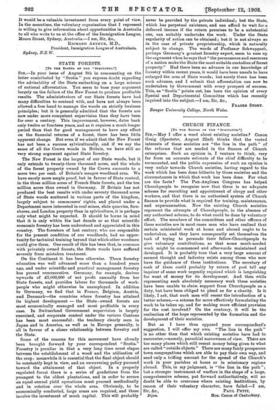CHURCH FINANCE. LTD TOR EDITOR OF TIIR si.turrArop-^ SIR,—May I
offer a word about existing societies P Canon Greig (Spectator, August 22nd) thinks that the vested interests of these societies are "the liou in the path" of the reforms that are needed in the finance of Church enterprises. Such an opinion is, I venture to think, very far from an accurate estimate of the chief difficulty to be surmounted, and the public expression of such an opinion is very unfair towards Church societies, having regard to the work which has been done hitherto by those societies and the circumstances in which that work has been done. For what are the facts ? The Pan-Anglican Congress has helped Churchpeople to recognise now that there is no adequate scheme for recruiting and appointment of clergy and other workers, and that there is no authorised system of Church finance to provide what is required for training, maintenance, and superannuation. Now the existing Church societies represent the attempts of Churchpeople, in the absence of any authorised scheme, to do what could be done by voluntary effort. The members of the committees and other officers of these societies are in most cases men who have realised that certain ministerial work at home and abroad ought to be undertaken, and they have consequently set themselves the task of trying to persuade their fellow-Churchpeople to give voluntary contributions, so that some much-needed work might be commenced and afterwards maintained and developed. It is probably true that a very large amount of earnest thought and industry exists among those who now have the guidance of these institutions. The secretary of each of them could probably by return of post tell any inquirer of some work urgently required which is languishing for want of money for its development. And then while representing such absolutely necessary work these societies have been unable to claim support from Churchpeople as a duty, but have been obliged to plead as for a charity. Is it likely, I ask, that such men will resent the introduction of a better scheme,—a scheme for more effectively forrnulatitig the work to be taken up, and for making more efficient provision for the cost involved? On the contrary, it will be the realisation of the hope represented by the formation and the development of their societies.
But as I have thus opposed your correspondent's suggestion. I will offer my own. "The lion in the path" is no other than that which existing societies have had to encounter,—namely, parochial narrowness of view. There are too many places which still resent money being given to what are called "outside objects." There are many fairly prosperous town congregations which are able to pay their own way, and send only a trifling amount for the spread of the Church's work in poor parishes at home or in missionary regions abroad. This, in my judgment, is "the lion in the path " ; but a stronger instrument of warfare in the shape of a large, comprehensive scheme, put forward authoritatively, will no doubt be able to overcome where existing institutions, by reason of their voluntary character, have failed.—I am,










































 Previous page
Previous page